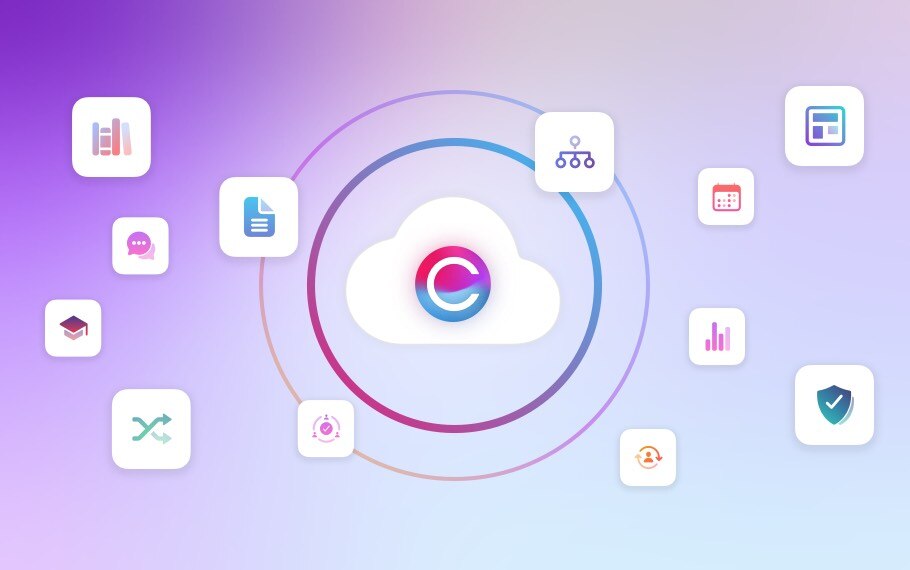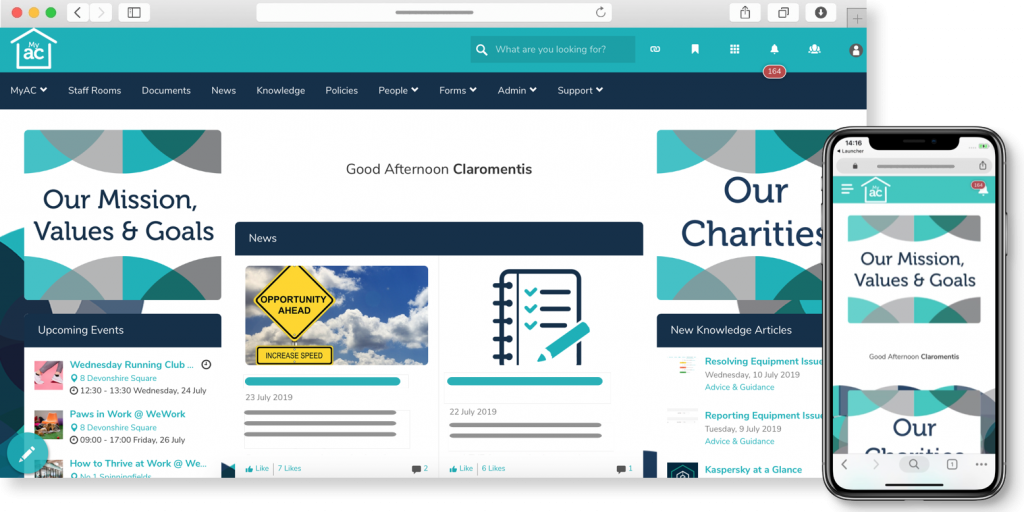Packed with tools that support all business functions, you cannot afford to ignore the potential of a great company intranet solution.
Whereas in the past a company intranet was little more than a boring interface used to display quick access applications and recent pages a user visited, today’s intuitive and high-functioning designs make the company intranet a business-critical tool that employees value, enjoy using, and actively engage with.
Indeed, a sound intranet strategy can dramatically increase revenue, improve company culture, and enhance employee engagement.
This is crucial for business. According to a recent Gallup report, companies with highly engaged employees registered a 21% increase in productivity, resulting in a 22% increase in profitability. Thus, customising your intranet to achieve business goals has a measurable impact on the organisation.

(Image source: getlighthouse.com)
The purpose of a company intranet
When designing a company intranet, always begin with the end goal in mind. Just like creating an engaging website to drive business growth, the company intranet should be geared towards achieving your top business objectives. Some common goals include:
- Connect members of an organisation with each other
- Share information, work tools, and resources
- Facilitate communication and collaboration among team members
- Increase employee engagement
- Streamline work processes to improve efficiency
How to design a company intranet
The foundation of modern, robust business intranet software is intuitiveness. Like a well-designed website, a well-designed intranet is not just appealing on the eye, but easy – a joy, even – to use and navigate. It should also be cloud hosted and device agnostic, so that users can access it from any location and device.
We recommend you work with an intranet company that specialises in intranet design so you can get expert advice on the best design options for your business. Once your objectives are clear, consider the following factors while building your company intranet.
Accessibility
A common complaint that comes up with traditional document management systems is that finding information is tedious. Users have to sift through multiple lines of data to get the files they need.
Good intranet software solves this problem by simplifying access to files, folders, work tools, and applications by building keywords into the system. By including intuitive Document Management Software (DMS) in your intranet, you will reduce the time it takes for all staff to search for and find information.
An intelligent DMS allows automatic desktop-to-cloud syncing and intuitive search capabilities that can even display file content. Of course, since you want your intranet to be accessible remotely from different devices, you will also need to ensure there is sufficient security to prevent data from getting into the wrong hands. As such, password protection, user monitoring, and access controls are all crucial features of a secure intranet design.
Integration
Successful integration between your intranet and third-party applications delivers consistent functionality and seamless collaboration between work tools and social networks. As software enterprises grow, they require agile integration with workspace collaboration tools that do not disrupt business operations.
The best intranets integrate seamlessly with the company’s social media accounts (Facebook, Twitter, LinkedIn, etc.), business productivity tools (Slack, Trello, Google Workspace, etc.), and document management applications (Dropbox, OneDrive, Google Docs, etc.). If you need custom integrations, look for a provider with an in-house custom development team that can build bespoke intranet solutions in line with your precise business requirements.
The best intranets integrate seamlessly with your company’s external apps.
Security
An insecure intranet exposes sensitive data to attackers and unethical employees. A secure intranet should make it all but impossible for data to fall into the wrong hands from cyberattacks, data theft, and information sharing with third-party collaborators.
Your intranet provider should provide reliable security measures and regular system security check-ups as part of your intranet package. In addition, you should develop security policies to streamline your safety standards to best practices and compliance regulations.
Intranet security must-haves include:
- Two-factor authentication
- Password policies to prevent users from submitting weak passwords
- Pen testing exercises to identify system vulnerabilities
- Single sign on integration
- Encrypted connections
Intranet homepage features
An intranet’s homepage is your network’s hub that gives quick access to applications and serves as a centralised communication meeting point. Over the years, there has been a substantial improvement in how intranet homepages look and feel. Slick, modern, and fully-branded designs are now the norm – and you should expect nothing less.
Companies can now design their intranet to meet their strategic goals without sacrificing the visual appeal of the intranet’s homepage.
Here are the top homepage features to consider:
Branding: Your company intranet is your company intranet – not someone else’s. As such, it should be unique to your business. This may mean keeping branding in line with your company’s logos, colours, and taglines – or, you can give your intranet a unique name, like Midwest Energy & Communications (MEC) does with its “Moogle” branding, emphasising the intranet’s role as the central hub for company information and communication.

Company news banner: Including a company news banner on the intranet homepage gives your staff a sense of constant connection with the latest company-wide news.
Quick links and tasks: Simple navigation and high functionality should be embedded into your intranet’s homepage design. Indeed, good intranet design is all about delivering value for users by supporting staff to do their jobs. Including quick links to tasks and applications on the homepage makes sure the intranet is as practical as it is beautiful.
Rewards and recognition: Recognising staff for work well done has a huge impact on company culture, morale, engagement, and productivity. A rewards widget that allows management and staff to recognise good work and say thanks boosts that sense of community.
Blog integration: employees may be too busy to check out your company’s blog, so why not highlight content on your intranet’s homepage? Tailor blog highlights to what employees want to read, content that is relevant to their work, motivational blogs, or fun-to-read information snippets.
Other great features to consider in your intranet’s homepage design include:
- Chatbots and help desks
- Quick access menus
- Links to internal social networking tools
- Recently visited locations
- Productivity tools – calendar, clock, notes app, etc.
Design plays a crucial role in influencing intranet adoption and engagement. It’s also important to ensure your company intranet is designed with integrations, accessibility, and security in mind. We recommend that you work with a reputed intranet service provider who’ll customise your private network to your precise business goals.



